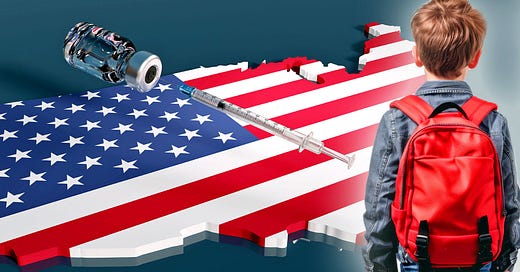Public Support for Religious Exemptions Nearly Doubled Over Past 6 Years
Public support for religious exemptions to school vaccine requirements doubled, from 20% in 2019 to 39% in 2025.
Public support for policies that allow parents of schoolchildren to opt out of vaccinating their kids for medical, religious and personal or philosophical reasons is growing, according to a survey conducted by the Annenberg Public Policy Center at the University of Pennsylvania.
The center conducted a nationally representative opinion panel from Jan. 3-5, 2025, of 1,077 U.S. adults, and compared the results to those from its own 2019 survey. The 2019 survey was also nationally representative and involved 2,344 U.S. adults in April and May of 2019.
The 2025 survey had a sampling error margin of +/- 5.2 percentage points at the 95% confidence level. The 2019 survey had a sampling error margin of +/- 2.8 percentage points.
A report released Jan. 28 describing the differences between the 2019 and 2025 surveys revealed that roughly two-thirds of U.S. adults (63%) in 2025 “somewhat or strongly support” a law allowing parents in their state to choose not to vaccinate their children for medical reasons. In 2019, about a third (36%) supported such a policy.
In 2019, only 17% of U.S. adults said they would support parental choice not to vaccinate their children for personal or philosophical reasons. By 2025, that number had doubled, with 35% of U.S. adults saying they would support school vaccination opt-out options for personal or philosophical reasons.
Public support for religious exemptions to school vaccine requirements also doubled, from 20% in 2019 to 39% in 2025.
Only 24% of U.S. adults ‘strongly support’ school vaccine requirements
The survey results also revealed that only 52% of U.S. adults support having their state require vaccination as a condition of school attendance.
That’s a nearly 20% drop in just six years, the researchers noted. The drop in public support was “across all political groups,” the Annenberg Public Policy Center wrote in its report.
Moreover, the percentage of U.S. adults who “strongly support” school vaccination requirements has dropped significantly from nearly half (47%) in 2019 to just under a quarter (24%) in January 2025.
Certain vaccinations are required for school attendance in all 50 states and Washington, D.C., according to the National Council of State Legislatures (NCSL).
The requirement is intended to protect children who cannot be vaccinated for medical reasons, the Annenberg Public Policy Center said.
Although all states offer exemptions from school vaccination requirements for medical reasons, not every state allows religious or philosophical exemptions, according to the NCSL.
Thirty states and Washington, D.C., provide religious exemptions from school vaccination requirements for religious reasons. Thirteen states allow exemptions for personal or philosophical reasons.
The Annenberg Public Policy Center did not immediately respond to The Defender’s comment request.
Other recent polls show growing mistrust of CDC, FDA
The same day that the Annenberg Public Policy Center released its results, the Kaiser Family Foundation (KFF) published polling results on similar topics.
KFF’s results showed less of a shift in overall vaccine attitudes than the Annenberg Public Policy Center’s results.
For instance, KFF’s results showed that roughly 8 in 10 (83%) U.S. adults say public schools should require some vaccines for students, allowing for health and religious exceptions.
In the KFF poll, researchers asked a nationally representative group of 1,310 U.S. adults questions via an online and phone survey. The sampling margin error was +/- 3 percentage points.
The KFF survey also found that public trust in government health agencies has dropped over the past 18 months. The decline began during the COVID-19 pandemic, according to KFF researchers.
The percentage of U.S. adults who say they they trust the Centers for Disease Control and Prevention (CDC) “a great deal” or “a fair amount” to make the right recommendations on health dropped from 66% in June 2023, to 61% in January 2025.
Public trust in the U.S. Food and Drug Administration (FDA) and state and local public health officials each dropped by at least 10%, respectively, over the last 18 months.
A recent poll commissioned by Children’s Health Defense (CHD) also revealed public mistrust of the FDA and CDC.
The national survey, conducted in November 2024 by Zogby Strategies, showed that 36% of voters do not trust the CDC and FDA, while 59% do trust them, leaving 5% undecided.
The overall margin of sampling error was +/- 3.2 percentage points, with subgroups having higher margins.
Commenting on the results from CHD’s poll, CHD CEO Mary Holland said the data highlight “a significant loss of trust in our regulatory agencies.”
“Allowing this distrust to persist will further undermine the public’s confidence in our healthcare organizations,” she said.
Holland added:
“We must emphasize that if the government wishes to regain credibility, it must recognize the realities of vaccines. Until that happens, Americans are less likely to heed their guidance, and the remaining public faith in these institutions will ultimately vanish.”
CHD’s poll also showed that more than half of voters believe they should be able to sue a vaccine maker if they are injured by a vaccine.
Related articles in The Defender
Poll: More Than Half of Americans Want Right to Sue Vaccine Makers for Injuries
Record Number of Louisiana Parents Opt Out of Back-to-School Vaccines
‘Critical Win’: Appeals Court Strikes Down San Diego Schools COVID Vaccine Mandate
Nurse Sues New Jersey Hospital That Denied Her Religious Exemption for Flu Vaccine






Why does anyone need an exemption? Why can’t one just say I don’t want to participate?
Let’s pray it quadruples!